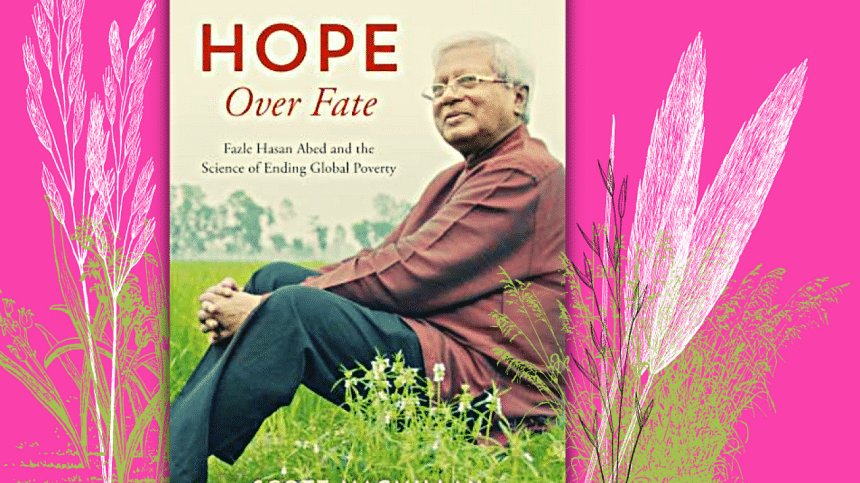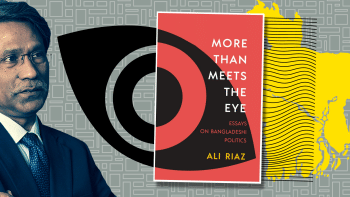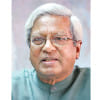Hope over fate

Scott MacMillan serves as the director of learning and innovation at BRAC USA, based in New York. Having worked with the organisation for nearly a decade, he is a knowledgeable insider to the BRAC world, the anti-poverty mission-driven organisation founded and led by Fazle Hasan Abed for nearly five decades. He had close access to the book's subject, his family members, friends, and close associates. The research and writing for the book (originally planned as an autobiography) began well before Sir Fazle Abed was diagnosed with a brain tumour and bravely decided against treatment with an uncertain outcome. With his passing on December 20, 2019, the poor in Bangladesh and the world lost a great champion who had fought for them in the trenches as a foot soldier and as a leader, achieving unparalleled success.
In 27 concise chapters and under 300 pages, the author covers a lot of ground on Abed's family history, his childhood in an elite family in Sylhet, his education in East Pakistan, and later in the United Kingdom. Abed lived in England for nearly 10 years, first studying naval architecture in Glasgow and later accounting in London. The book covers the period of his return home to take a managerial position as a foreign-educated professional, managing finance and accounting for Shell, an American multinational in the energy industry, with an office in Chittagong, East Pakistan.
The impact of the great cyclone (Bhola Cyclone) of November 12, 1970, and the subsequent civil and political upheavals leading to Bangladesh's Liberation War rudely disrupted his quiet life as it did for millions of his fellow citizens. These experiences eventually led to a radical shift in young Abed's career and life trajectory. It pushed him (and his friends and colleagues) to turn into citizen-volunteers and relief aid-workers who plunged impromptu into disaster-relief work.
Finding himself at the epicentre of the disaster, Abed realised that a large number of deaths (an estimated 500,000) in the "world's deadliest known tropical cyclone" were not necessarily caused by the natural disaster. He observed first-hand how the administration in Dhaka and Islamabad had largely ignored the tragedy and suffering of the victims, making it difficult for local and global relief agencies to do their work.
These experiences forced the young Abed to reconsider his priorities and core values. They led him to eventually pivot from large, global for-profit enterprises to a lifelong commitment to building an organisation which would be business-like in its management and operations, with a laser-like focus to transform the lives of the poor and vulnerable, through creative interventions for their upliftment.
A talented writer, MacMillan paints a moving and honest picture of the subject, often with intimate personal details, which makes the book such a compelling read. He takes the reader behind the scenes of Abed's larger-than-life public persona. This approach is a welcome relief from the practice of biographers who paint a glorified picture of the subject of their biography, discussing only the highlights, avoiding any narratives which may diminish their high stature in the public domain.
Sociologists use the term "wicked" to designate poverty as a societal problem, given the complex nature of the intertwining factors entrapping the poor. Sir Abed's lasting legacy is a commitment to outside-the-box thinking, data collection, analysis, experimentation, measurement, and continuous improvement. Hence the book's subtitle, "the science of ending global poverty" is most appropriate.
Sir Abed was meticulous and methodical about his work. Adopting the mindset of a scientist, he was fearless in his commitment to tinkering, borrowing ideas, learning from the best in the world, inviting other pioneers to partnerships, sharing credit, and remaining a bold champion of the poor for the greater good of the society. It is no hyperbole to conclude that through his work, he "changed the world" for millions of poor families in Bangladesh.
Consider the statistics—80 million reached annually through community health education and services; 1.6 million mothers counselled on breastfeeding and complementary practices; 700,000 pregnant women served by skilled attendants during childbirth. Multiply these numbers with 30, 40 or 50 years, and you get a sense of the enormous impact of BRAC (and Grameen Bank and other developmental NGOs). Their work in Bangladesh demonstrates that if we focus on the poor—empowering one woman at a time —economic growth and development will take care of itself.
This book is highly recommended for researchers and scholars interested in poverty, community leaders and staff working for NGOs and development organisations, political leaders and students studying development—in short, anyone interested in changing the world for the better, by helping those at the bottom of the economic pyramid enhance their lives for a brighter future.
Munir Quddus is Professor of Economics and Dean of the Business School at Prairie View A&M University near Houston, Texas. He is the President of Bangladesh Development Initiative (BDI), a research Think Tank based in America. Email: [email protected].

 For all latest news, follow The Daily Star's Google News channel.
For all latest news, follow The Daily Star's Google News channel. 











Comments